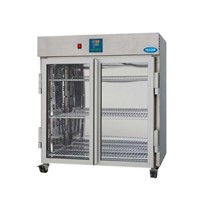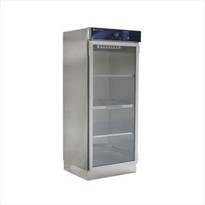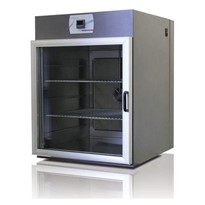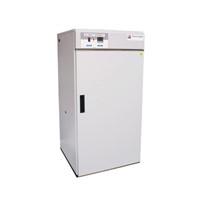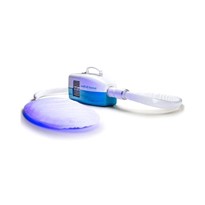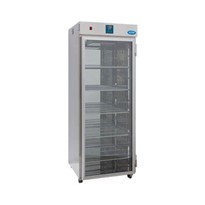Warmers, in general, are used to heat fluids before injection to prevent hypothermia following a surgical procedure. Similarly, blankets are warmed before use in a blanket warmer to reduce the patient's heat loss.
Cabinet Blanket Warmers are the most common type of blanket warmers. They resemble cabinets or storage units with shelves where blankets are placed. They are equipped with heating elements that maintain a consistent temperature to warm the blankets. Cabinet blanket warmers can vary in size and capacity, accommodating different quantities of blankets. These can also come as draw-type units or smaller portable units. The similarity is that they all are loaded with blankets to warm them before use.
Thermoline manufactures a range of cabinet blanket warmers here in Australia. They are equipped with digital temperature control and fan-forced circulation to ensure even warming of the blankets. Maximum temperature is restricted to 60°C to prevent overheating and potential patient injury. It should be noted that fluids should not be heated in the same cabinet as the blankets. The temperature for fluids is much lower, so a separate cabinet is needed to prevent overheating.
Below we'll discuss some of the reasons for using a blanket warmer in more detail. The concept of warm blankets isn't just about offering comfort, although that is a significant part; it has proven therapeutic benefits.
Patient Comfort: Warm blankets can provide comfort and a sense of relaxation to patients, especially in environments where they may be experiencing discomfort or undergoing medical procedures. Warm blankets can help alleviate the chill often associated with hospital rooms, making patients feel more at ease.
Hypothermia Prevention: Patients recovering from surgery, undergoing specific medical treatments, or experiencing shock are at risk of developing hypothermia, which is a dangerously low body temperature. Warm blankets can help prevent or address this condition by keeping the patient's body temperature within a safe range.
Post-Operative Recovery: After surgery, patients may experience a drop in body temperature due to the effects of anaesthesia and the exposure of their body during the procedure. Warm blankets can aid in post-operative recovery by helping patients regain and maintain a normal body temperature.
Improved Blood Flow: Warmth from blankets can help enhance blood circulation and oxygen delivery to tissues, which is beneficial for wound healing and overall patient well-being.
Relaxation and Stress Reduction: The sensation of warmth can calm patients, reducing stress and anxiety levels. This can contribute to an improved overall patient experience and aid in the healing process.
Bedridden Patients: Patients who are bedridden or have limited mobility may benefit from using warm blankets to prevent discomfort and pressure sores, which can result from prolonged contact with cold surfaces.
Paediatrics: Using a blanket warmer in neonatal units or paediatric settings can help maintain an appropriate environment for newborns and infants. Infants are more sensitive to temperature changes, and maintaining their body temperature is crucial for their well-being. Warm blankets provide comfort and help stabilise body temperature, which is especially vital for premature babies. These warmers are also commonly used in pediatric units to create a child-friendly atmosphere and ease anxiety in young patients.
It's important to note that while blanket warmers have clear benefits, they should be used carefully to avoid overheating and burns. As well as having temperature restrictions within the controller's programming, healthcare professionals should have and follow guidelines, protocols and other safety measures appropriate to the use of blanket warmers for the well-being of their patients.
If you have any questions on blanket warmers or warmers of any kind, please get in contact with our sales team.


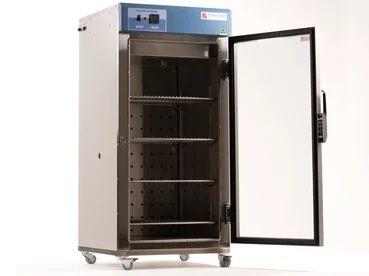
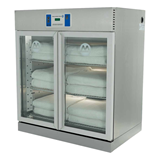
-160x160-state_article-rel-cat.png)












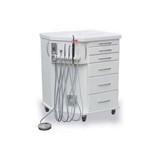
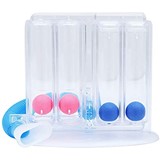

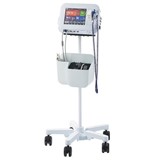
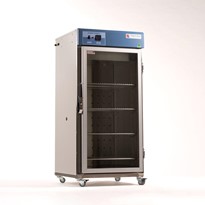
-205x205.jpg)
-205x205.jpg)
-205x205.jpg)
